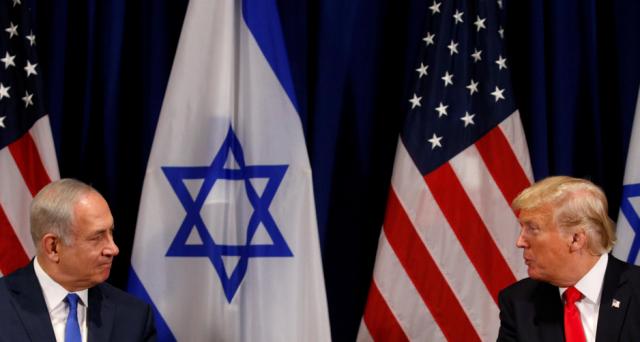US President Donald Trump has reportedly said that he thinks Israeli Prime Minister Benjamin Netanyahu is a bigger obstacle to the Middle East peace process than the Palestinian leadership.
During a short meeting between Mr Trump and UN Secretary General Antonio Guterres on the sidelines of the UN General Assembly in New York last week, the US president allegedly said of Mr Netanyahu and Palestinian Authority (PA) President Mahmoud Abbas “both leaders are problematic”.
According to a Western diplomat who was briefed on Trump’s comments, however, “the general context was that from the two of them, Netanyahu is the bigger problem.”
The meeting was first reported by left-leaning Israeli newspaper Haaretz, who said that the account was backed up by seven different Western and Israeli sources who were either at the meeting or briefed on it afterwards.
The claims have been dismissed by the White House.
“This was a short but productive meeting that primarily focused on UN reforms and the great job [US Ambassador to the UN Nikki] Haley has been doing. After discussing the United States’ defence of Israel at the UN, the participants quickly addressed the ongoing peace conversations,” a statement said.
“The president said that he feels both sides want to make peace and he remains optimistic about an enduring peace deal. We are focusing on our productive conversations and not on the noise created by spoilers.”
Mr Trump is widely viewed in Israel and the wider Middle East as far more sympathetic to Israeli interests – including the contentious issue of settlement building – than his predecessor Barack Obama.
However, he has repeatedly expressed a sincere desire to broker a peace deal in the intractable Israeli-Palestinian conflict, meeting with both sides in Washington, Jerusalem and Ramallah since taking office in January.
During Mr Netanyahu’s state visit to DC in February Mr Trump suggested that he is open to the idea of a one-state, rather than two-state, solution to the intractable conflict.
Such a move would be a marked change from US policy since Bill Clinton’s tenure which, alongside the UN, EU, Arab League and others, has been to promote the idea of a peace deal involving a Palestinian state.
Since entering the White House Mr Trump has caught some Israeli hard-liners off guard with the suggestion the Netanyahu coalition government should “hold back” on settlement building in the West Bank, and his administration has equivocated over whether the US embassy will move from Tel Aviv to Jerusalem as promised.
The president has made it clear he wants to be the US leader to achieve a lasting peace settlement, previously calling it the “ultimate deal”.
According to another high-level diplomat source who spoke to Haaretz, Mr Trump reiterated that with the elderly Mr Abbas in need of a legacy, and Israel confident in the backing of a presidency sensitive to its security needs, there is currently a “a pretty good shot” at peace.
The administration has not so far elaborated on any new policies or timetables to revive the long-stalled negotiations














